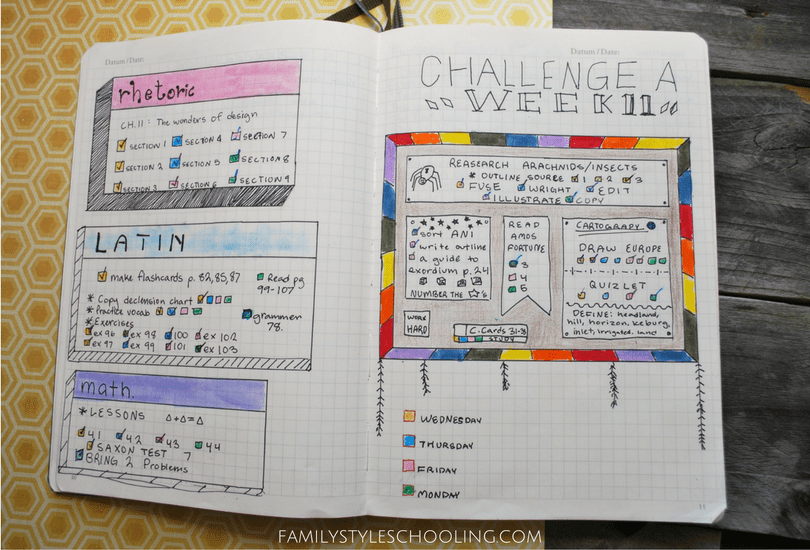Two Student’s Perspectives on the Classical Conversations Challenge Programs
I've been able to speak at a couple of Classical Conversations Parent Practicums this summer, and one of my favorite parts is the afternoon Challenge panel. This is where parents get to ask questions of Challenge students of various experience. If you're a tutor, you often miss these times of insight into the minds of teens. I sat my kids down and asked them a couple of my favorite questions from previous Challenge panels to share their responses with you! I hope you enjoy!

How do you plan out your schedule at home?
Andy: When I first started Challenge A, my planning was fairly vague and broad within the subject. Pretty much I didn't plan out specifics of what I really needed to do. Over the years I've learned to list out everything I need to do, which doesn't only include school, but other events occurring in my life. This helps me find reasonable times to complete my school work efficiently and not save so much for the last night before our CC group meets. When I started Challenge I, my mom gave me the idea to start using a bullet journal. This is a great way to create your own schedule without being stuck to the boundaries of a typical pre-formated planner.
Alyssa: Thankfully, I had the opportunity to watch my brother schedule his Challenge work so I could learn from his experiences. I also started off with a pre-formated planner in Challenge A, but I struggled with making it work for me. After the first semester, I got my very own bullet journal and it's worked for me ever since. My favorite way of scheduling is writing everything I need to do categorized by subject, and then I make a little box by each task. I use four different colors to fill in the boxes according to the day that I want to complete the work. Whenever I go back to do my work, I only work on the boxes that correlate to that day. I've found that making my planner "pretty" (decorating it with washi tape, etc.) motivates me to get my work done.

How does your preparation at home impact your class experience?
Andy: Over the Challenge years, I have discovered that I am not a fast processor. I like to take my time to think before I comment in the conversation. Because of this, I realize that the more prepared I am, that is, the more I've worked hard to dig deep into the materials at home and take good notes, the more I am able to participate in conversations in class.
Alyssa: I have found that whenever I'm at home, if I work on something, then I either bring my understanding or my confusion to class. As long as I have worked on it, I can help bring about productive discussions that benefit the class.
What was your favorite project you completed this year?
Andy: My favorite project from Challenge III was writing our virtue papers. My class was tasked with the question: What is virtue, and can it be taught? These questions really drew out the best conversations in my class and cultivated better discussions than we could have imagined. It also forced us to define our beliefs on the topic and make a stand from our point of view. A final benefit from this project is that it inspired the novel I'm currently writing.
Alyssa: My favorite project from Challenge B was Mock Trial. Although it was challenging, I really enjoyed searching through evidence to find clues to form an argument. I also enjoyed playing different characters: an attorney and the defendant. Mock Trial helped me to look at something from multiple perspectives. Working with my class on a project together brought our class closer in our relationships.
What does it look like to have a sibling also in a Challenge program?
Andy: As the older sibling, I have enjoyed watching my sister work through the same projects and read through the same books that I did. My favorite part of having a sibling in Challenge is that we can have good discussions whenever a topic arises. I like knowing that I don't have to feel awkward talking about difficult topics with my sister, and knowing that she's been learning to enjoy conversations as well. When my sister was working on writing her short story this year in Challenge B, it reminded me about my short story when I wrote it and the joy that it brought me. This inspired me to start writing again, and we've started working on writing a novel together this summer.
Alyssa: Since I have an older sibling in a Challenge program, I have enjoyed being able to go to him and talk about subjects that he's already completed and going through. We can discuss subjects that are hard for me and it's interesting because we are different people. Subjects that are hard for me may have been hard for him. I'm excited because my little sister is entering Challenge A this year, and I'll be able to share my experience with her.
How can parents help you be successful in your work?
Andy: Each year my mom checks in with me to see which subjects I want her to work on with me. Then we find a time that we can really wrestle through that difficult subject together. For other subjects, I can always go to my mom and ask for her help when I get stuck. Sometimes all I need is someone to talk through a problem with. For example, my dad can be very helpful with math. When I'm stuck on a problem, all I need to do is explain the problem to him and I come across my error on my own. He just asks good questions to help me uncover my mistakes.
Alyssa: Most of the time, I feel like I can complete most of my work on my own. I've found that often, it turns out to be the other way around. If I want to complete my tasks with excellence, I need help beyond my own ability. The best way for my parents to help me is to just ask me questions about my work. This helps me still feel like I'm thinking for myself, but it helps me get beyond where I could have gotten on my own.
Betsy Strauss is an unexpected homeschooler, mother of three, who is in a relationship with a sweet man for life. She loves reading books, drinking coffee, and learning anything with her kids.

